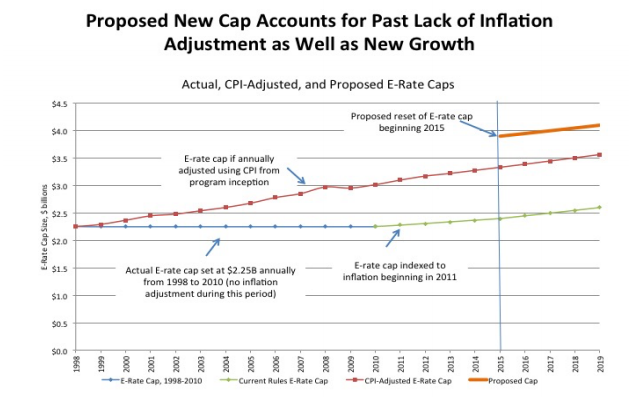FCC Chairman Tom Wheeler, in Press Call with Sen. Markey, Proposes $1.5 Billion Increase in E-Rate
WASHINGTON, November 17, 2014 – Federal Communications Committee Chairman Tom Wheeler and Sen. Ed Markey, D-Mass., on Monday proposed increasing the $1.5 billion cap to the E-rate portion of the Universal Service Fund. Schools and libraries, who would benefit from such an increase, have been calling
Schools and libraries, who would benefit from such an increase, have been calling for it for years now. Despite requests for E-rate funds increasing annually and totalling more than $5 billion in 2012, the original funding cap of $2.25 billion for E-rate, which had been in place since 1997, was increased marginally to $2.4 billion in late 2010 to adjust for inflation.
“Our workers in the 21st century will get the skills set in school so they can compete in the global marketplace,” said Sen. Markey, who played a key role in the creation of the original E-rate when a member of the House during the passage of the 1996 Telecommunications Act.
Along with a series of policy changes aimed at enhancing affordability of service, Chairman Wheeler’s proposal would increase the cap to $3.9 billion. The move would continues the committee’s recent efforts to modernize fundamental aspects of the E-rate program.
In order to accomplish the proposed permanent increase to the E-rate cap, Americans with telephone lines would pay an additional 16¢ per month, totaling about $2 a year, in addition to the 99¢, on average, that they already pay per month. The increase will help to bring high speed connectivity, which the FCC currently defines as 100 Megabits per second, Mbps, to the 75 percent of libraries and 33 percent of schools that currently lack such a complete connection.

Rep. Henry A. Waxman, D-Calif., supported the Wheeler proposal, stating, “The E-Rate program is a critical component of our national competitiveness strategy…Rural and low-income areas must have access to the world class connections they need to take advantage of today’s digital learning tools. I urge the FCC to take this next step to put E-Rate on strong footing for generations to come.”








Member discussion